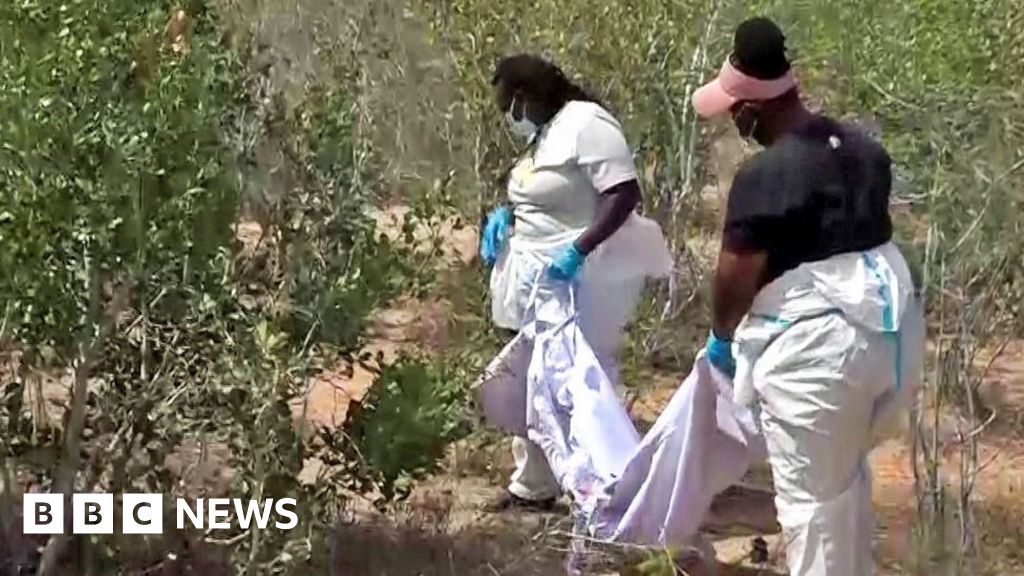New bodies found near site of Kenya's starvation cult burials

```html New Bodies Found Near Site of Kenya's Starvation Cult Burials
Kenyan authorities have discovered nine more bodies near the Shakahola Forest, the site of a mass starvation cult where over 400 people were found dead last year. The exhumations, ordered after the disappearance of several children, are reigniting fears that the cult, led by self-proclaimed pastor Paul Mackenzie, may still be active.
The grim discoveries were made in the Kwa Binzaro village, close to Shakahola Forest. Five bodies were exhumed on Thursday and a further four on Friday. Detectives are continuing to search the vast area, anticipating the discovery of more graves.
Fresh Investigation and Lingering Concerns
The exhumations were ordered in July following a new probe triggered by the disappearance of children. Prosecutors have stated that 11 people have been arrested in connection with the case, including three alleged followers of Mr. Mackenzie during the "Shakahola Forest Massacre."
The latest finds confirm concerns raised earlier this year by Interior Minister Kipchumba Murkomen, who alleged that Mr. Mackenzie was communicating with his followers from jail, potentially using a mobile phone. This raised fears that he was continuing to exert influence and incite further harm.
Mr. Mackenzie, who was arrested last year, has pleaded not guilty to manslaughter. He is accused of instructing his followers to starve themselves to death in order to reach heaven more quickly. His ongoing case was recently adjourned by a Mombasa court due to the discovery of new evidence, according to AFP news agency.
Search Continues, Public Urged to Report Missing Persons
Government pathologist Richard Njoroge told Reuters news agency that the search is far from over. "We have not exhausted the search; the area is very, very vast. So we expect more bodies," he said.
Authorities are appealing to the public for assistance. "This is to appeal to the members of the public who may have lost their loved ones or who may suspect that their loved ones are missing to report to Malindi District Hospital. We have a Red Cross desk there, where their details will be taken, and also their DNA samples will be taken," Mr. Njoroge added.
The exhumation of 18 more gravesites is scheduled to continue on Monday.
Historical Context and Rise of Religious Extremism
The Shakahola Forest tragedy has brought into sharp focus the issue of unregulated religious groups and the potential for extremism in Kenya. While freedom of religion is enshrined in the Kenyan constitution, the government has faced increasing pressure to regulate religious organizations more effectively to prevent similar incidents.
Dr. Agnes Kabuki, a sociologist specializing in religious studies at the University of Nairobi, notes that economic hardship and social instability often create fertile ground for cults and extremist religious movements. "When people feel marginalized and disillusioned, they become more vulnerable to charismatic leaders who offer simple solutions and a sense of belonging," she explains. "The Shakahola case is a tragic example of how such vulnerabilities can be exploited."
Evidence of Foul Play and Ongoing Investigation
Human rights activist Hussein Khalid, CEO of Vocal Africa, witnessed the exhumations and reported concerning findings. "The first body which was found by itself appeared to have been put there fairly recently - two to three weeks back. But the other four appear to have been there a while and were in a decomposing state," he told the BBC.
Mr. Khalid also highlighted a gravesite where no remains were found, suggesting possible foul play. "No remains were found but it appeared as if days ago, someone, some people or some group must have removed the corpse that was there," he said, adding that only pieces of children's and women's underwear had been left behind. "That sent a chilling message that it is possible the person or persons who were buried there were women and children."
The Office of the Director of Public Prosecutions stated in July that they believe those buried may have been "starved and suffocated as a result of adopting and promoting extreme religious ideologies." The investigation continues to uncover the full extent of the atrocities committed and to bring those responsible to justice.
The Broader Implications for Religious Freedom and Regulation
The Shakahola tragedy has ignited a national debate about the balance between religious freedom and the need for government oversight. Critics argue that the government has been too slow to address the proliferation of unregulated churches and religious groups, creating an environment where extremist ideologies can flourish.
According to legal analyst Elias Omondi, the Kenyan government faces a complex challenge. "While it is crucial to protect religious freedom, the state also has a responsibility to safeguard its citizens from harm," he says. "The key is to develop a regulatory framework that is both effective and respectful of constitutional rights."
The ongoing investigation and exhumations at Shakahola Forest serve as a stark reminder of the dangers of religious extremism and the importance of vigilance in protecting vulnerable populations. ```
Originally sourced from: BBC News Africa
